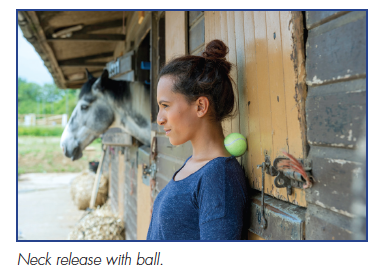How your riding is affected
muscles in your neck and upper back will tend to tense up to support your head and protect your neck.
The more you push your body while you have neck pain, the greater the protective response, and this will result in tension being transmitted into your shoulders and down your arms. So your horse will be able to sense your neck pain through the reins and in its mouth.
How to help yourself
Neck release with ball
Stand against a wall and position the ball at the back of your neck, just to the side of your spine. This can also be done with two balls at the same time, one on either side. Lean back onto the ball, slowly feeling it sink into your body until it meets resistance, then stop. Wait in that position, keeping the rest of your body soft, and feel as your muscles open up.

For the best results, this release should take at least five minutes, but if you are very sore, you should follow your body and stop if you need to. Remember that you are not looking to find the painful spots, just resistance. If the ball is on a
point that is sore, try readjusting it so you are more comfortable.
You could do this release while standing and leaning against a wall, sitting in a high-backed chair, or lying on your back on the floor or bed.
Alternative releases:
- Chapter 6: Chin forward
- Chapter 6: Shoulders elevated
Tendonitis
The meaning of “-itis” is inflammation, so tendonitis is simply inflammation of a tendon. Tendons are the strong bands that attach each end of your muscles to bone. They are vulnerable to injury and inflammation because they are not very stretchy and do not have as good a blood supply as the muscle itself.
This means that if they are injured—for example, being overstretched or twisted or suffering a direct blow—it takes much longer for them to heal. Tendonitis can also occur when stress is put onto the tendon from tightness and restrictions elsewhere in your body. For instance, if your pelvis is rotated, the forces transmitted through your fascial network will put your muscles and tendons under tension. So if there is even a minor injury, the tendon is much more likely to overstretch and become inflamed. This may happen without an actual injury if the irritation from other restrictions is bad enough.
Tendonitis can affect any muscle, but the most common places are shoulders (rotator cuff disease), elbows (tennis and golfer’s elbow), and ankles (Achilles tendonitis). More information about inflammation can be found in chapter 4.